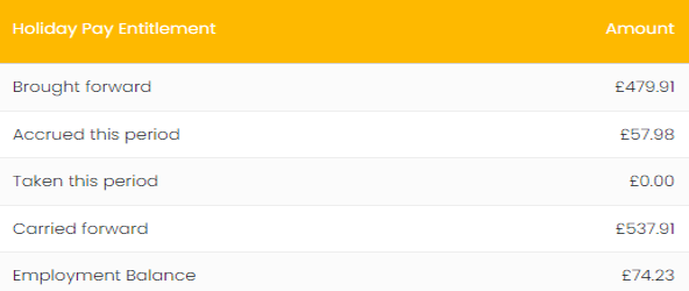Clockwork News. |
|
Prime Minister Rishi Sunak asserted that the Tories were the party known for "sound money" and stated that under another Tory government, working individuals would be able to "retain more of their hard-earned money". The Conservatives will unveil their election manifesto soon, pledging to reduce National Insurance by an additional 2p if they win the election. National Insurance (NI) is a tax paid by employees, employers, and self-employed individuals on their earnings. It is understood another 2p cut in the rate for employees will be in the manifesto - as well as the bigger aim to scrap the tax entirely when it is "financially responsible" to do so. The government already cut NI for employees twice in 2024, taking it first from 12% to 10%, and then 10% to 8%. This would be the third rate cut overseen by Mr Sunak, reducing the employee rate to 6p. wHAT DOES THIS LOOK LIKE?
0 Comments
WHAT IS NEONATAL CARE LEAVE?The Neonatal Care (Leave and Pay) Act 2023 gives employees a new right to time off work when a baby they have responsibility for is in hospital receiving neonatal care. This new type of leave will be in addition to the current family friendly rights such as maternity leave and paternity leave. It will only apply in the specific circumstance when the child requires neonatal care. DO you NEED TO DO ANYTHING NOW?No. Although the Act is now in force, the Government must create Regulations before the new right can be brought in and these have not yet been made. The Act itself does not give detail about how neonatal care leave will work in practice; it is the Regulations that will do this. However, we are able to build a picture of how it might work from previous Government documents. The Government has stated that it expects neonatal care leave to be available to eligible employees from October 2024. WHAT IS NEONATAL CARE?For the purposes of neonatal care leave, neonatal care is care of a medical or palliative kind which starts within 28 days of the child’s birth. The child must be in neonatal care without interruption for a period of at least seven days, beginning with the day after the day on which the care starts. WHO IS ELIGIBLE TO TAKE NEONATAL CARE LEAVE?Employees who have parental or other responsibility for a child who is receiving, or who has received, neonatal care may take neonatal care leave. Regulations will specify who exactly may take neonatal care leave though it may include the following: a) the mother of the baby b) the father of the baby c) the mother’s spouse, civil partner, or a partner who will be living with the mother and baby that is in neonatal care in an enduring family relationship d) the intended parents in surrogacy arrangement e) the intended parents in cases of adoption Neonatal care leave will be available from day one of employment provided the other eligibility requirements are met. However, there is a service requirement in respect of the pay element which is explained later. The child must begin receiving neonatal care within 28 days of its birth and the care must be for at least 7 days. This means that the parents of a child who is admitted for neonatal care at, for example, 35 days old, will not qualify for neonatal care leave. HOW MUCH LEAVE CAN THE EMPLOYEE TAKE?An eligible employee is entitled to at least a week’s leave. Regulations will specify the total length of leave permitted but it is expected that this will be capped at 12 weeks. The amount of leave to be taken will match the number of weeks that the child receives neonatal care. For example, if the child receives neonatal care for three weeks, the employee will get three weeks of neonatal care leave. If the child receives neonatal care for 15 weeks, the total neonatal care leave will be 12 weeks due to the effect of the cap. It is anticipated that the leave will need to be taken in a continuous block rather than in single days. WHEN CAN THE LEAVE BE TAKEN?The leave must be taken within 68 weeks of the date of the child’s birth. HOW DOES NEONATAL CARE LEAVE INTERACT WITH OTHER FAMILY LEAVE?Once an employee is on maternity leave, they would not be able to end it to go on to neonatal care leave and then back on to maternity leave when the baby is out of hospital. In practice therefore, the neonatal care leave will be taken at the end of the maternity leave period (or paternity leave period, if the employee qualifies) even though this may mean that the time when the leave is taken is not actually when the child will be receiving the neonatal care. Even if an employee does not qualify for another type of family leave, for example, paternity leave, they would still be entitled to neonatal care leave if they satisfy the eligibility criteria. WHAT NOTICE DOES THE EMPLOYEE NEED TO GIVE?The Government’s intention is to create a two-tiered approach for notice requirements: • where the child’s admission to neonatal care is sudden and unexpected, the employee is to provide informal notice to take the leave at short notice. • where the neonatal care leave is to start when the child has not recently been admitted into neonatal care - see above on interaction with maternity leave - then a longer notice period of at least a week would be given. However, Regulations will set out the detail. WHAT PAY WILL THE EMPLOYEE RECEIVE?The level of pay has not been confirmed, however, it is expected that this will be the same rate per week as other family leave, like maternity leave.
Listen up, UK workers with funky schedules and part-year positions! Starting April 1, 2024, a shiny new holiday accrual system will be rolled out just for you. And, guess what? Rolled-up holiday pay will be totally legit! The new rules will clarify the "week's pay" definition and the carry-over policy. But wait, there's more! Sadly, the Covid carry-overs will be given the boot. Check out our Holiday Changes Guide Below:  Holiday Pay for Temps and Umbrella Workers: A Positive UpdateAs many of us have recently been enjoying some well-deserved time off, there's been a quiet yet significant change that has taken place. You may already know that some umbrella companies and recruitment agencies have a tendency to withhold holiday pay from their workers – a legal practice that's certainly not ethical. Luckily, there's been a positive development in this area that's worth noting. The Misconception of "Rolled-up Holiday Pay" Being Unlawful for Irregular Hour Workers Has Been Debunked. In the past, there have been some who defended their unethical position, claiming that "rolled-up holiday pay" was illegal. However, this is no longer the case. Recent changes to the law now recognize rolled-up holiday pay as a legitimate way to provide holiday entitlement for irregular hour workers. This is fantastic news! Clockwork can now offer rolled-up holiday pay for leave years that begin on or after April 1, 2024 Understanding Rolled-Up Holiday Pay: Definition and ImplicationsHave you ever heard of rolled-up holiday pay? It's a way of receiving your holiday pay entitlement as part of your normal pay rate. However, this practice was declared unlawful because it goes against the fundamental principle of the Working Time Regulations, which states that everyone should be given paid time off work. As a result, many agencies and umbrellas accrue holiday pay on behalf of their workers, which is then paid to them when they take a break. The Advantages of Rolled-Up Holiday PayHave you ever wondered about the benefits of rolled-up holiday pay? Unfortunately, some agencies and umbrellas have exploited the system to their advantage by preventing their workers from receiving the proper holiday pay they deserve. Rolled-up holiday pay, on the other hand, ensures that you receive your holiday pay at the same time as your regular pay, which means it can't be wrongfully withheld from you. It's important to note that you won't be entitled to any pay during your holiday period, but this arrangement guarantees that you'll receive your holiday pay when it's due. What if I don't want rolled up holiday?It's essential to recognize that the new law doesn't mandate rolled up holiday pay, but rather it provides an option for it. Your agency or umbrella company will guide you on how they handle your holiday entitlement. It's generally best practice for you to make the decision whether you want your holiday pay to be rolled up (i.e. paid on top of your normal rate) or accrued (i.e. paid when you take time off). The new legislation does not dictate that we must offer rolled-up holiday pay, but there is no reason for us not to – if any worker or yourself is not being paid through Clockwork and hasn’t had any holiday paid double-check with the umbrella it could be that they plan to profit by withholding your money. Providing Transparency with Holiday Pay EntitlementsAt Clockwork, we believe in transparency, which is why we 1. We are SafeRec certified, 2. We always keep our contractors informed about their holiday pay entitlements. On each payslip issued, we clearly outline how much holiday has been paid, released, or accrued. Follow our Linkedin Page: https://www.linkedin.com/company/clockwork-contracting/
Did you see our latest articles: December: https://www.clockworkcontracting.co.uk/news/december-newsletter-hmrcs-latest-umbrella-guidance-helpful-or-nothing-new November: https://www.clockworkcontracting.co.uk/news/archives/11-2023 Is HMRC's newest umbrella guide a life-saver or just old news? Last week, HMRC released new guidelines for recruitment agencies using umbrella companies. It sounds like a step in the right direction, but what about the hardworking folks under those umbrellas? Let's find out!
Nothing's flipped on its head Get ready for a drumroll, folks, because we've got some news! Well, not really. Brace yourselves for a "hype over substance" moment: despite the fanfare, there are no new rules or regulations to speak of. It's more of a PR stunt to distract us while we tap our feet impatiently waiting for the government to finally regulate this sector. What's the verdict, you ask? The HMRC's latest guide for recruitment businesses doesn't exactly break new ground. In fact, it looks like a copy-paste job from their 2021 version, with a few minor updates from 8 November 2023. But wait, there's a hidden gem in there that could make your day! Finally, there's a section that's all about you - the unsung hero who usually gets forgotten. Back up your teammates! Although most of the latest guidance is a bit of a snooze, I can't help but give a fist pump to the fact that there's finally a section dedicated to the real MVPs: you, the workers! You're the ones who get hit the hardest by decisions made higher up, yet you get the least amount of say in the matter. It's enough to make me want to scream into a pillow! The tax folks at HMRC suggest these tips for agencies with umbrella-paid staff:
But, does it pass muster? As sneaky tax avoidance schemes evolve and lure in recruiters and workers, the current guidance falls short. The advice is just too basic and universal to shield recruitment agencies from the clutches of a non-compliant umbrella company. To see the latest tax avoidance scheme list visit the below page: https://www.gov.uk/government/publications/named-tax-avoidance-schemes-promoters-enablers-and-suppliers/current-list-of-named-tax-avoidance-schemes-promoters-enablers-and-suppliers As we dive into this crisp and cozy month of November, I'm thrilled to share some exciting updates with you all. From holiday bonuses to upcoming company events, this month's payroll newsletter is filled with good news and gratitude. Let's kick off the month with a big smile and a happy payroll update!
Under the current government, we have witnessed a significant increase in employment rates, reaching near record highs. Similarly, unemployment rates have reached near record lows. In fact, for the month of September, the number of payroll employees was 30.1 million, which is 370,000 higher compared to the same time last year, and 1.1 million higher than before the pandemic. This success can be largely attributed to the UK's flexible labour market, which allows businesses to thrive, expand, and generate job opportunities for individuals throughout the country. On 12 May 2023, the government instigated a discussion on potential revisions to three aspects of EU employment law that have been retained after our departure from the EU. These adjustments aim to streamline processes and eliminate unnecessary red tape, thereby facilitating a more efficient workforce. The areas under review include the record-keeping obligations outlined in the Working Time Regulations, the complexities of calculating annual leave and holiday pay under the same regulations, and the consultation requirements in the Transfer of Undertakings (Protection of Employment) or 'TUPE' Regulations. Through these proposed changes, the government hopes to promote a more effective and business-friendly work environment. So, this means that workers will be able to receive their holiday pay as part of their regular wages, rather than having to take unpaid leave when they go on holiday. This is especially beneficial for those who have irregular work hours or work part of the year, as they may not have a consistent income and cannot afford to take unpaid time off. This change also addresses the issue of holiday pay being unfairly withheld from umbrella and agency workers, who may have been denied their rightful holiday pay due to the previous restrictions on rolled up holiday pay. This change will also help close any legal loopholes that may have allowed for the withholding of holiday pay. Overall, this is a positive development for workers and ensures that they are able to take their entitled paid leave without facing financial strain. The government's decision to allow rolled up holiday pay for irregular hour and part-year workers is a step towards fair and equal treatment for all employees. If anyone wishes to geek out by reading the reform the link is attached. Catch up next time when we discuss our findings from November's budget on the 22nd November. Our summer holidays are over, the kids are back at school, the weather forecasters say that we’re in for a mini heatwave, and we now hear that food prices have dropped for the first time in two years. Let’s enjoy October! But how is it that Christmas cards, mince pies, and Quality Street are now piled high on the supermarket shelves? What is going on? Let’s enjoy what’s happening right now, which leads me nicely into the first item of this month’s article, as the Chancellor announces that the lowest paid will get a pay increase of up to £1,000 from next April. National Living Wage to increase to over £11 per hourAlthough we won’t get to know all the details until November, the Chancellor announced in his speech at the Tory party conference, that the government has accepted the Low Pay Commission’s recommendations that the National Living Wage should increase to over £11 an hour from April 2024, meaning that the annual earnings of a full-time worker on the National Living Wage will increase by over £1,000 next year. There are currently more than 2 million people aged 23 and over who are eligible for the National Living Wage and are likely to benefit from the increase. HMRC apologises for miscalculating student loan repaymentsHMRC has revealed that around 16,000 taxpayers may have been overpaying their student loan due to a miscalculation in the repayments due. The problem arises in a very specific set of circumstances and only affects employees who have received certain benefits in kind (BIKs) which have been processed through the payroll. Specifically, affected taxpayers are those who meet all of the following criteria:
These taxpayers now have a choice between receiving a refund or leaving the overpaid amount in their student loan account, reducing the outstanding balance and any interest that may be due. HMRC has written to all affected student loan borrowers to apologise for the error and explain their options and what steps they need to take. HMRC is working to fix the error and allow the relevant BIKs to be entered separately from total PAYE income on the Self Assessment return. If you think that you may be affected you can find more information on GOV.UK Changes on the way for Automatic Enrolment A Private Members’ Bill to help millions save more into their pension and start saving sooner has cleared Parliament and been granted Royal Assent. The Bill introduces powers to reduce the age for Automatic Enrolment from 22 to 18, and starts pension saving from the first pound earned.
These changes, along with changes to Defined Contribution pension schemes announced by the Chancellor in July, could see the average earner’s pension increase by nearly 50% if they save throughout their entire career, while a minimum wage earner could see their pension pot increase by over 85%. However, these changes won’t happen just yet as the Department for Work and Pensions will be launching a consultation on implementing the new measures. Right to work - Important changes to the EU Settlement SchemeFrom September 2023 people with pre-settled status under the EU Settlement Scheme will automatically have their status extended by 2 years before it expires if they have not obtained settled status. The process will be automated by the Home Office and reflected in the person’s digital status. They will be notified of the extension directly. This will ensure that nobody loses their immigration status if they do not apply to switch from pre-settled to settled status. The Home Office also intends to take steps to automatically convert as many eligible pre-settled status holders as possible to settled status once they are eligible for it, without them needing to make an application. During 2024, automated checks of pre-settled status will establish their ongoing continuous residence in the UK. Safeguards will be in place to ensure that settled status is not wrongly granted. Right to work – Tripling of fines for employing illegal migrantsThe Home Office has confirmed that fines will be tripled for employers who employ workers who do not have the right to work in the UK.
The civil penalty for employers, which was last increased in 2014, will be increased from £15,000 to £45,000 per illegal worker for a first breach and up to £60,000 from £20,000 for repeated breaches. Employers should already be checking the eligibility of anyone they employ (known as right to work). There are a number of ways to do this, which are not changing, including via a manual check of original documentation and a Home Office online checking system. Guidance is available on GOV.UK What does AUDIT AT SOURCE mean?! 😊
Let's start answering this question by explaining the current situation. Today 100% of Umbrella Companies' audits/assessments are conducted based on the documents provided by the umbrella company. It means trusting that the organisation you audit is honest to provide the company with truthful documents! What if the Umbrella Company provide forged RTIs? Forged Contracts? But what happens when it is not the case? What happens if you audit a non-compliant or non-ethical umbrella company that provides auditors with doctored documents? This is why SafeRec introduce... Audit at Source! 🚀🚀🚀 Thanks to our strategic partnership with payroll software such as Octopaye and JA (formerly JustAccounts), we audit SafeRec Certified Umbrella's payslips that we receive directly from the Payroll Software via API! And because everything is about transparency with us, each worker receives a copy of the payslip audit report! That is what we call at SafeRec "Audit at Source" where we audit documents at the generation stage - before the Umbrella Company has even the slightest chance to doctor anything! The next question is... what kind of Umbrella Companies would accept this level of scrutiny?! The compliant ones! - Clockwork Contracting, one of the first Umbrellas in the UK to be audited daily. But SafeRec does more than Audit at Source! We will be covering this next week! I will be talking about how everything we do is completely transparent and the role of our strategic partner WTT! The government has released a list of the most frequent causes of National Minimum Wage (NMW) underpayment, along with guidance on how to avoid them, to accompany the recently approved increases in the NMW. This checklist outlines the key reasons for non-compliance and provides links to additional resources. 1. Making wage deductions or taking payments from workers, for items or expenses that are connected with the job. See Deductions from pay and payments by workers that reduce minimum wage pay)
2. Making wage deductions or taking payments from workers for the employer’s own use or benefit where the employer is free to use that money in any way they wish. See Deductions or payments for the employer’s own use and benefit) 3. Failure to pay for any additional time added on to a worker’s shift, for example team handovers between shifts or time spent passing through security checks on entry and exit. See Working hours for which the minimum wage must be paid) 4. Failure to pay a worker for any time during their shift when they are at the workplace and required to be available for work, (even if no work is being provided at that time during their shift). See Working hours for which the minimum wage must be paid) 5. Failure to pay a worker for any travelling time. See Time spent travelling on business. 6. Failure to pay a worker for any time spent training. See Working hours for which the minimum wage must be paid) 7. Failure to pay sufficient money for any time worked during a sleep-in shift. See Sleep-in shifts) 8. Incorrectly applying the minimum wage accommodation offset when an employer provides living accommodation to a worker. See Accommodation Offset) 9. Paying the minimum wage apprentice rate when the worker isn’t a genuine apprentice. See Apprentices) 10. Paying the minimum wage apprentice rate before a worker starts their apprenticeship or after it ends See Apprentices |
AuthorJack Chinnery - Head of Payroll Archives
February 2024
Categories |













 RSS Feed
RSS Feed
